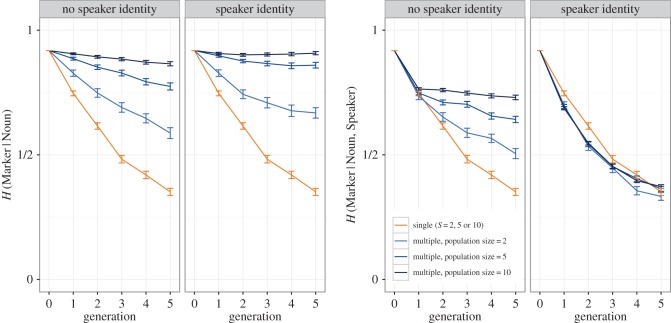Figure 3.
Simulation results for multiple-person chains, where we manipulate whether learners can access and exploit speaker identity during learning. Results for single-person chains are shown for reference, all results are averaged over 100 simulation runs. The pair of plots on the left shows H(Marker|Noun), i.e. conditional entropy of plural marking given the noun being marked, averaged across the population—this captures the extent to which there is a conditioned system of variability that is shared and therefore independent of speaker. There is no effect of the speaker identity manipulation here, and learning from multiple people slows the development of a population-wide system of conditioned variation. The right pair of plots shows H(Marker|Noun, Speaker), i.e. conditional entropy of plural marking, given the noun being marked and the speaker—this measure captures the development of speaker-specific systems of conditioned variation, where each speaker conditions their marker use on the noun being marked, but allows that different speakers might use different systems of conditioning. Here, we see an effect of the speaker identity manipulation: in the no speaker identity models, these results essentially mirror those for H(Marker|Noun), i.e. no conditioning develops due to mixing of data from multiple speakers; however, in the model where learners can track speaker identity, speaker-specific systems of conditioning emerge, as indicated by smoothly reducing H(Marker|Noun, Speaker).

